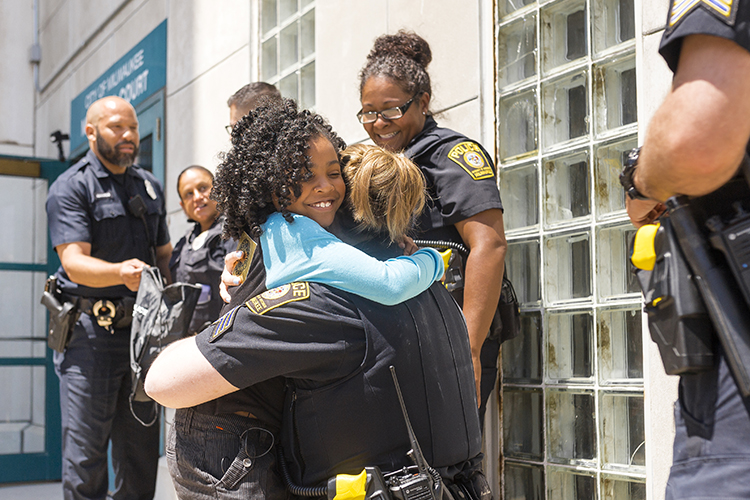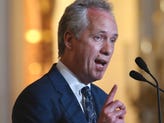Craig Greenberg was born on August 22, 1973 in Commack, New
York, which is a small upper middle class hamlet (comprising 12.23 square
miles) on Long Island. It’s claim to fame is a Methodist church built in 1789
and the National Jewish Sports Hall of Fame and Museum which is located in the
Suffolk Jewish Community Center.
His family moved to Louisville in 1980 where he attended Ballard
High School in Louisville. From there, he obtained a Bachelor of Science degree,
majoring in political science and government, from the University of Michigan. He
was the student government president and Phi Beta Kappa.
It’s worth mentioning that Phi Beta kappa is one of America’s
oldest and most prestigious academic honor
societies, having been founded in 1776. It’s members have included 17
presidents, 42 U.S. Supreme Court Justices, and 136 Nobel Prize recipients. After graduating in 1995, Greenberg went on to
attend Harvard University’s School of Law where he graduated cum laude with a
Juris Doctorate in 1998.
In 2000, Greenberg cofounded the Venture Capital Fund and
Technology Consulting Company I-Visionary in Lexington, Kentucky, where he
served as the Chief Operating Officer and the company’s general council. That
same year, he was named one of Business First’s “Top 40 Under 40”. In 2001,
Ballard High School named him “Alumni of the Year”.
He was part of the development team for the Museum Plaza and
Whiskey Row, and then with art investors, Steve Wilson and Laura Lee Brown,
cofounded the 21C Museum Hotels chains. He served as president in 2012 and CEO
in 2017 before stepping down in mid-2020.
Prior to his election, Greenberg was an attorney with Frost,
Brown, and Todd, one of Louisville’s best known law firms. His job there was developing
some of the firm’s ancillary business ventures, including an initiative to secure
and “deploy” new market tax credit investments to lower tax liabilities for
businesses. He helped to raise and invest roughly $100 million dollars in low
income communities throughout Kentucky and elsewhere using the federal tax
credit program.
Greenberg is also a cofounder with sports radio host, Matt
Jones, of the Greenberg Group, which co-owns the Ohio Valley Wrestling, holding a majority share of stock, where he
served as CEO, president, and general counsel. According to Gurufocus, Greenberg is also a
director of Republic Bancorp and holds about 6,272 shares of Republic Bancorp
stock.
Craig is married to Rachel, a public school teacher.
Together they have two children, Daniel and Benjamin. His mother, Dr Ruth
Greenberg, died at the end of January 2024 after what was described as a “brief
illness”. Greenberg, like his mayoral predecessor,
Jerry Abramson, is Jewish.
Ultimately, Greenberg was just one of seven running on the
Democrat ticket, with 3rd District Metro Council member and mayoral
candidate, Shameka Parrish-Wright appearing to be the early favorite given her
strong support among black voters (she won her seat in 2023 with 88% of the
vote). However, all that changed on
February 14th---Valentine’s Day---2022.
That was the day when 21 year old Quintez Brown walked into
Greenberg’s campaign office in the Butchertown Market area on Story Avenue and
fired several shots from his 9mm Glock semi-automatic at near point blank range at Greenberg, who was seated in his chair, miraculously only nicking his shirt and sweater.
Brown, who was a prominent spokesperson for the local Black
Lives Matter movement and a professed “social justice advocate”. Interestingly,
Brown himself was running for a seat on Metro Council. Brown then turned and
ran as staff members immediately tried to barricade the door.
According to reports, Quintez Brown was arrested a few blocks
away, still carrying his Glock. The police reported that he was also carrying nine
fully load clips! Sounds like he was anticipating a showdown with someone. During
questioning, Brown confessed that he went to Greenberg’s office with a single
intent---to kill him.
According to the city prosecutors, Brown was miffed at
Greenberg because of his support for the West End Increment Financing (Greenberg helped
draft the legislation). Brown believed that the proposal would result in the “gentrification”
of the West End which would draw in wealthier individuals and upscale businesses, thus forcing out
existing low income residents and neighborhood
businesses.
Officers found images of Greenberg, portrayed as a “devil”
engulfed in flames posted online allegedly by Brown. They also discovered
that Brown belonged to a Black nationalist militia which self-identifies as “Black
Jews” and God’s true “chosen people”.
The day following Brown’s arrest, the Black Lives Global Network
Foundation and the Louisville Community Bail Foundation jointly posted $100,000
to cover Quantez's bail. Greenberg, as well as Democratic Senatorial candidate
Charles Booker, and incumbent Republican Senator Mitch McConnell expressed
utter dismay that (as Greenberg said) “someone can attempt murder on Monday and
walk out of jail on Wednesday”.
Nevertheless, Quintez Brown was rearrested a short time later on federal charges and sent to the Grayson County Detention Center in Leitchfield, Kentucky. In March 2022, a grand jury indicted Brown on state charges of attempted murder and four federal counts of wanton endangerment. Although his attorneys said they would consider an insanity plea, Brown confessed to the changes on July 2024 and earned himself a 17 year sentence.
As an aside, it was revealed during the trial that Brown had done an extensive online search in an attempt to find where Greenberg lived and like to hand out. Additionally, Brown was interested in knowing the personal details of Republican mayoral candidate and popular former Jeffersontown mayor, Bill Dieruf as well (something which the media downplayed).Following the murder attempt (and subsequent publicity),
Craig Greenberg’s campaign jumped into high gear, picking up huge numbers of
endorsements and massive amounts of donations, winning the Democratic Primary
with 41.3% of vote, defeating Shamika Parrish-Wright, the former top contender,
by 16, 848 votes.
The history of the mayoral race in Louisville is, to be
polite, a bit lopsided. The last Republican candidate elected as mayor was Ken
Schmied in 1965. Ever since it’s been a Democrat, no matter how things went in
Louisville, it seemed that the Republicans didn’t have a chance (of course,
part of that is the cliquish nature of the local GOP and its tendency toward
being disorganized and not thinking out of the box).
However, the best chance to pick up the illusive seat seemed
to be former Jeffersontown mayor, William “Bill” Dieruf. A self-identified “centrist”, Dieruff was president
of the Jefferson County League of Cities and served on the Kentuckiana Regional
Planning and Development Agency, as well as Greater Louisville, Inc., and was
the owner of Dieruf Hardware Store. He also had a history of working with all
sides irrespective of party and given that Louisville is one of last Democrat
bastions in Kentucky, that’s a good thing.
For those unfamiliar with Louisville and Jefferson County, Jeffersontown (aka “J-town”) is the second largest city in Jefferson County with a population of 29,388. and, thanks to the Bluegrass Commerce Park, the third largest employer in the state. The Commerce Park alone has approximately 850 employers (Papa John Pizza is headquartered there).
Just 4.3% of the J-Town’s population live at or below the poverty line. Compare that to 15% of Louisville’s population or the fact that Louisville ranks 7th among its peer cities in poverty and the 5th highest poverty rate in the country. Not exactly something to write home about.Dieruf was appointed to J-town’s City Council in 2000 and
served until 2010 when he was elected mayor and would go on to serve 10 years
as its mayor. Running on the platform of “Mayor for Everyone”, he promoted
public safety, job creation, economic development, and improving the quality of
Louisville’s and emphasizing “solutions with accountability”.
But, facing a Democratic
majority of 324,434 to 185,701, and with a history of strong turnouts, a local Republican
party known for shooting itself in the foot, snubbing potential political allies,
traditionally low Republican and conservative turnouts, a questionable media, Dieruf had a tough row to hoe (not to mention
the “free press” the attempted murder of Greenberg generated locally and
nationally).
In the end, Craig Greenberg, a largely unknown candidate with
no political experience won with 51.7% of the vote, defeating an individual with
years of actual hands on political experience in running a city. In hard
numbers, Greenberg received 143,799 votes to Bill Dieruf’s 128,690. As an aside,
I can relate. With over 25 years’
experience at the time, I ran for Metro Council against an unknown and lost in
what was later deemed a “questionable race”.
Since Greenberg’s election, there’s been a lot of “buyer’s remorse” coming from the Democrats and the Left. Crime remains a serious problem and gang activity, once denied by the LMPD, is an undebatable fact. The city’s infrastructure continues to deteriorate, the quality of local schools haven’t improved (in 2024 the schools faced a disaster when the bus schedules were badly botched, leaving some without transportation), and of course, well-paying jobs remain elusive with taxes continuing to go up.
Louisville, once a major transportation and manufacturing center, could claim Nashville Tennessee, Indianapolis Indiana, St. Louis Missouri, and Cincinnati Ohio as peer cites. Sadly, those days are long gone. Louisville has become largely a warehouse hub filled with “McJobs”. Carjackings, assaults, gangs, and until recently, years of low police moral, high turnover and a total lack of leadership, has become the norm. We depend on whiskey and a two minute horse race we milk for two weeks to keep our relevance.The city has spent billions repeatedly trying to revive a downtown
whose best days past in the 1960’s. Taxes increase proposals are rubber stamped.
The infrastructure will continue to deteriorate until something tragic happens
to force change. Residents in the county bemoan the choice they made when they
approved a grossly misrepresented city-county
merger while talk of local succession grows.
Meanwhile, in just a couple of years, residents will go to
the polls again. Will we buy the shiniest rotten apple in the bin? Probably. It
seems to have become our most defining national trait. A self-inflected wound we try to blame on the
other side. It reminds me of Charlie Brown and Lucy at the start of every
football season. But remember, there are alternatives. We just have to look up
from our Smartphones and take a look around.
Thank you for reading
"Another Opinion", the Op/Ed blog page for the "militant
middle". Here at "A/O" we truly value our readers. At
A/O we seek the facts as they exist, not partisan talking points. We
hope you find our articles informative and engaging. Comments are welcome,
provided they are not vulgar, insulting or demeaning. Another
Opinion is offered without charge and is directed toward all independent and
free-thinking individuals. We ask, however, that you "like" us on
whatever platform you found us on in order to keep our articles available for
free to others. Lastly, in order to keep costs down, we depend on passive
marketing, and therefore, depend on our readers to please forward our posts
along. Below you will find links to the sources we used in writing this
article. Thank you.
Gurufocus: Craig Greenberg Net Worth and Insider Trader
Quintez Brown said he would be Equalizer on day he shot at CraigGreenberg, prosecutors claim
Metro United Way: Strong Households
From J-town to downtown, Bill Dieruff touts his ‘centrist’ bona fides for Louisville mayor
Attorney, developer, runner: Craig Greenberg wants ‘bigchanges’ if he is Louisville mayor























.jpg/132px-Santana_Row_(1).jpg)
